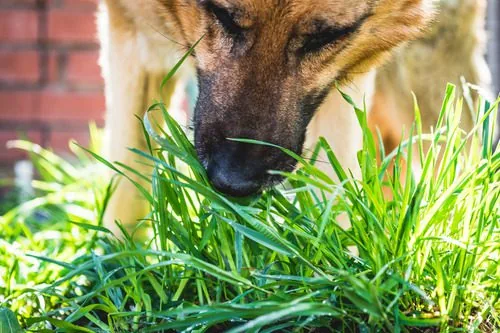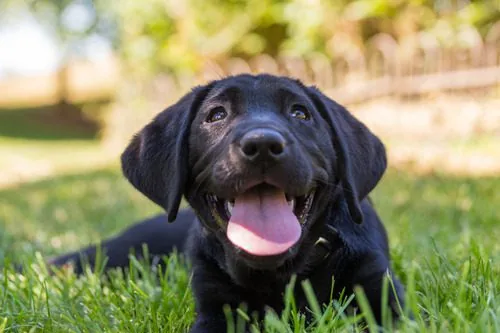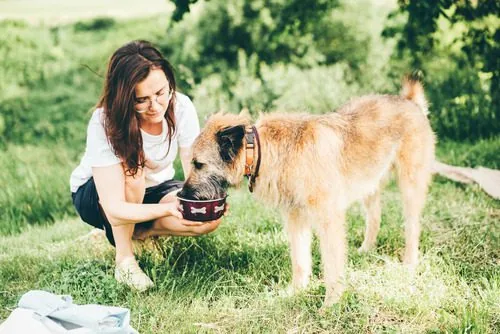Does your dog have hot spots? If so, you might find yourself wondering what you can do to take care of them or stop them from happening in the future. Hot spots are a challenging problem for dogs, and they can get out of hand very quickly.
Hot spots are sores on a dog’s body that are caused by bacteria. They are red and inflamed, and they usually itch and burn. Although they start small, they often become large and start to ooze, and dogs can’t stand leaving them alone. Unfortunately, the chewing and licking only makes the hot spot worse.
In this article, you’ll find out more information about the best treatment and prevention options for your dog’s hot spots. Read through this information to learn more, and don’t be afraid to talk to your veterinarian for further information too. Call Boughton Square Animal Clinic in Bolingbrook, IL at (630) 759-0093.

Treatment
Clipping or shaving
If your dog has a bad hot spot or an outbreak of them, clipping or shaving may be one of the best ways to help treat it. Matted hair can cause bacteria to become trapped against the skin and may make hot spots worse, so clipping or shaving can remove this issue.
Topical antibiotics
Your vet may prescribe topical antibiotic creams or ointments to help treat the problem. Although your vet might tell you to use human medication like Neosporin, it’s important to only do this if the vet recommends it, as this medication may be dangerous for some dogs.
Oral antibiotics
In more severe cases, your dog may be prescribed oral antibiotics instead. Your vet will give you this medication and tell you how much to give your dog and how often to give it. Be sure to follow these directions closely.
Cleansing
You will need to clean your dog’s hot spots with a mild cleanser until they improve. This may be uncomfortable for your dog, so it may require assistance from another adult in your household. Your vet will be able to give you more information about what to use and how to perform this cleaning.
Steroids
Finally, in very serious cases of hot spots, your vet may prescribe steroids to your dog. Steroids are able to take down the inflammation in your dog’s body and reduce the irritation relating to hot spots. This in turn makes it easier for your dog to stop licking and chewing, which helps the hot spot clear up. Steroids have some risky potential side effects, however, so it’s best to avoid using them unless there’s no other good solution for treating your dog.
Prevention
E-collar
You can prevent your dog from chewing or licking and making sores into more serious hot spots by putting her in an e-collar. However, you can’t leave your dog in an e-collar all the time, so this is only a short-term prevention or treatment solution.
Flea and tick treatment
Many times, hot spots are caused by irritation relating to bites from fleas or ticks. If you keep your dog on a good quality flea and tick prevention medication, you can help them reduce the risk of these irritated bites and cut down on the prevalence of hot spots at the same time.
Thorough drying
Another common cause of hot spots is moisture. If your dog’s skin has a lot of moisture trapped up against it, this will eventually cause a bacterial or fungal infection. This type of infection quickly leads to hot spots. By making sure you thoroughly dry your dog after a bath or after swimming, you can reduce the risk of hot spots as well.
Frequent grooming
Dogs with very long or thick hair may require regular grooming to keep hot spots from occurring or to keep them from worsening. Grooming can reduce the number of mats in your dog’s hair, and it can also help prevent moisture becoming trapped on your dog’s skin. Both of these factors make grooming a great long-term solution for the prevention of hot spots.
Exercise
Finally, make sure you exercise your dog physically and mentally as much as possible. Dogs who are bored or restless may be more prone to start chewing or licking as a nervous habit. This type of chewing quickly leads to hot spots as well, so it’s important to try to stop it before it starts. Keeping your dog’s mind and body engaged often throughout the day is a great way to do this.
Once you get your dog’s hot spots under control, it’s important to work hard to prevent them in the future. Speak to your vet if your dog has frequent or very severe hot spots, as you may need medical assistance to help get the problem solved.
With the right plan of action, you can help your dog reduce the risk of hot spots moving forward. For more information, call us at (630) 759-0093.
Recent Posts
6 Possible Causes for Your Cat’s Sneezing
6 Possible Causes for Your Cat’s Sneezing Cats are known for their curious and playful nature, but…
Why is My Dog Eating Grass?
Why is My Dog Eating Grass? Dogs are known for their curious behaviors, and one that often…
Can Dogs Eat Marshmallows?
Can Dogs Eat Marshmallows? Marshmallows are a popular treat for many people, but pet owners often wonder,…
Can Dogs Get Sunburn?
Can Dogs Get Sunburn? As summer approaches and the days get longer, many pet owners look forward…
Dog Dehydration: Symptoms, Treatment and Prevention
Dog Dehydration: Symptoms, Treatment and Prevention Dehydration in dogs is a common but often overlooked condition that…
About Boughton Square Animal Clinic
Since 1979, Boughton Square Animal Clinic has served Bolingbrook, IL and surrounding communities as both a veterinary care provider and a devoted partner in treating your animal family members for life.






